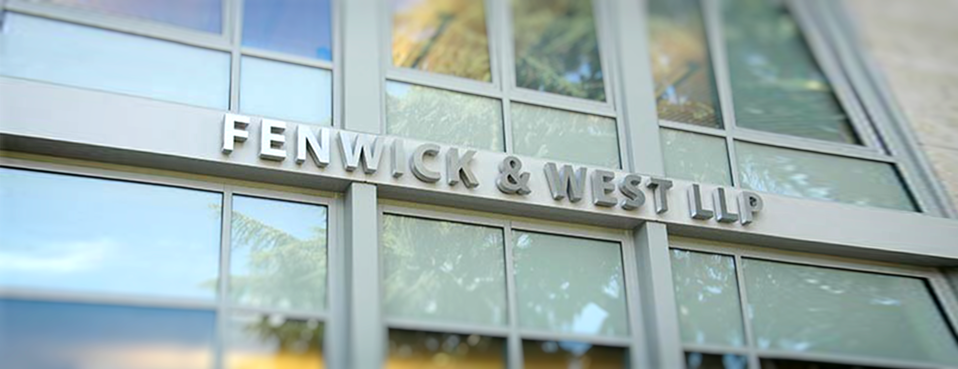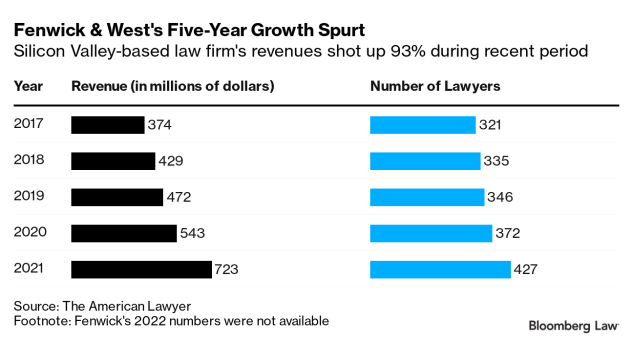FTX’s legal troubles are reaching its law firm, Fenwick & West, which faces federal law enforcement subpoenas and a class-action lawsuit tied to the failed crypto exchange.
Bankruptcy counsel for FTX has discussed “federal law enforcement subpoenas to Fenwick” with the law firm’s general counsel, Kathryn Fritz, according to a court document filed in March. The document, which details work by Sullivan & Cromwell lawyers on FTX’s bankruptcy in January, doesn’t say what the subpoenas requested or which investigation they pertained to.
Fenwick is also among a number of companies targeted with a class-action lawsuit alleging the firm helped aid a massive fraud led by Sam Bankman-Fried, the FTX founder now facing 13 criminal charges. Services Fenwick provided were “central to SBF’s fraud,” according to a February suit filed in Miami federal court on behalf of a proposed class of investors.
It’s awkward for any law firm to answer questions about actions for a client but particularly for Silicon Valley-founded Fenwick, which cemented its reputation as a go-to operation for the world’s top tech companies after it helped Steve Jobs incorporate Apple Inc. in 1976. The firm, whose clients have included Amazon.com Inc., Tesla Inc. and Meta Platforms Inc., nearly doubled its revenue in the five years leading up to 2021.
“Any time you have even the hint of regulatory impropriety in the practice of law, you and the firm take a hit,” said James Cox, a Duke University law professor. “It’s hard to say how long it lasts and how deep it is. But it’s certainly not a feather in your cap.”
Fenwick, Fritz and the firm’s outside counsel in the class-action case, Florida’s Gunster, did not respond to requests for comment. Sullivan & Cromwell declined to comment.
Fenwick’s Role
Fenwick advised FTX and its sister trading shop, Alameda Research, on areas including trademarks, tax and litigation before the crypto exchange’s implosion into bankruptcy in November. It also helped set up US-based companies affiliated with FTX and Alameda.
Daniel Friedberg, once the Seattle-based chair of Fenwick’s payments practice, joined FTX in 2020 and would later become its chief regulatory officer. Former FTX general counsel Can Sun was a past Fenwick associate.
Fenwick has axed references to FTX on its website. The firm trimmed FTX from a list of prominent clients on its homepage.
“Fenwick & West helped FTX to develop ‘compliance’ procedures designed to skirt FTX’s regulatory obligations or conceal its noncompliance,” the class action suit, which seeks unspecified monetary damages from Fenwick, alleges. The complaint besides Fenwick targets 20 other third parties with an alleged FTX connection, including auditors and venture capital firms.
Fenwick has yet to file a response to the lawsuit.
Steep Hurdle
Finding a third-party such as a law firm liable for any underlying fraud is a steep hurdle, said Patrick Coughlin, a Scott & Scott lawyer who represented shareholders of Enron following its collapse.
“The biggest challenge here is demonstrating what a law firm knew or didn’t know and their participation in actual transactions,” Coughlin said. “It’s going to be a lot harder to show that third parties—the accountants or the lawyers—were actually involved in the fraud.”
As for subpoenas, the main target may be the client and not the lawyers, said New York University School of Law Professor Jennifer Arlen. “The mere fact that a law firm was subpoenaed doesn’t mean that the firm is in legal jeopardy,” she said.
Prosecutors typically won’t be successful issuing subpoenas to law firms for conversations with clients, Arlen said. Nor will subpoenas capture work produced or generated on behalf of clients because of attorney-client privilege, she said.
But prosecutors do have the right to documents that a client creates and owns and turned over to its law firm to hold on to, Arlen said.
‘Principal’ Adviser
Some details about Fenwick’s relationship with FTX were revealed in January, as Wall Street firm Sullivan & Cromwell faced scrutiny over its past work for the exchange.
Fenwick was FTX’s “principal” adviser on “corporate, operational and corporate governance matters,” Sullivan & Cromwell partner Andrew Dietderich said in a court declaration in the bankruptcy proceedings.
He said Fenwick provided the corporate documents and organizational charts necessary for the Chapter 11 petition, which Sullivan & Cromwell filed on behalf of FTX on Nov. 11.
Fenwick is among a long list of third parties now facing scrutiny stemming from their alleged connections to the crypto exchange. Federal prosecutors in New York have accused Bankman-Fried of misappropriating billions of dollars in customer funds for his personal use and to make risky bets through Alameda Research.
The accountancies Prager Metis and Armanino are also defendants in multiple proposed class actions for allegedly aiding FTX’s fraud.
The companies audited key FTX entities and certified that the companies had controls in place sufficient to protect class member funds, according to the Feb. 22 complaint, “despite knowing full well that such controls were not in place.”
The action against Fenwick and others is currently at a standstill as parties await a May hearing focused on possibly consolidating the private actions connected to the FTX collapse.
Skyrocketing Revenues
Since its founding about a half-century ago, Fenwick has developed a niche as a full-service firm for tech and life sciences clients, across areas including intellectual property, corporate and litigation.
The firm reached $723 million in revenue in 2021—a 93% rise from the $374 million it earned five years earlier, according to figures collected by The American Lawyer.
In the same time frame, the number of lawyers at the firm jumped to 427 from 321. Fenwick hasn’t yet released financial figures for 2022.
With long-established links to the tech and startup space, Fenwick eagerly pushed into the digital assets arena. In addition to its work with FTX, the firm advised Coinbase, the biggest crypto exchange in the US, in its 2021 initial public offering.
The firm has advised Coinbase on more than 15 transactions. It has also represented Yuga Labs, the creator of the Bored Ape Yacht Club collection of nonfungible tokens, in transactional and litigation matters.
The ever-fluctuating state of crypto regulations has made it difficult for some firms to advise clients as they try to scale their companies, and as firms are eager to grow their crypto practice groups, said Eric Chason, a professor at William & Mary Law School.
“You’re operating in kind of a vacuum,” Chason said. “I can see it being tempting to be led to a place you don’t want to go.”
The case is O’Keefe v. Sequoia Capital Operations, LLC, S.D. Fla., 1:23-cv-20700, 2/22/23.
Credit: Source link




























